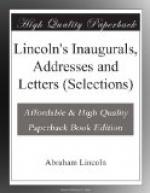insisted on his doing this, they very well knew they
insisted on that which he would not for a moment think
of doing, and that they were only bluffing him.
I believe—I have not, since he made his
answer, had a chance to examine the journals or
Congressional
Globe, and therefore speak from memory—I
believe the state of the bill at that time, according
to parliamentary rules, was such that no member could
propose an additional amendment to Chase’s amendment.
I rather think this the truth—the Judge
shakes his head. Very well. I would, like
to know then,
if they wanted Chase’s amendment
fixed over, why somebody else could not have offered
to do it. If they wanted it amended, why
did they not offer the amendment? Why did they
stand there taunting and quibbling at Chase?
Why did they not put it in themselves? But,
to put it on the other ground: suppose that there
was such an amendment offered and Chase’s was
an amendment to an amendment; until one is disposed
of by parliamentary law, you cannot pile another on.
Then all these gentlemen had to do was to vote Chase’s
on, and then, in the amended form in which the whole
stood, add their own amendment to it if they wanted
to put it in that shape. This was all they were
obliged to do, and the ayes and noes show that there
were thirty-six who voted it down, against ten who
voted in favor of it. The thirty-six held entire
sway and control. They could in some form or
other have put that bill in the exact shape they wanted.
If there was a rule preventing their amending it
at the time, they could pass that, and then, Chase’s
amendment being merged, put it in the shape they wanted.
They did not choose to do so, but they went into a
quibble with Chase to get him to add what they knew
he would not add, and because he would not, they stand
upon that flimsy pretext for voting down what they
argued was the meaning and intent of their own bill.
They left room thereby for this Dred Scott decision,
which goes very far to make slavery national throughout
the United States.
I pass one or two points I have because my time will
very soon expire, but I must be allowed to say that
Judge Douglas recurs again, as he did upon one of
two other occasions, to the enormity of Lincoln—an
insignificant individual like Lincoln—upon
his ipse dixit charging a conspiracy upon a
large number of members of Congress, the Supreme Court,
and two Presidents, to nationalize slavery. I
want to say that, in the first place, I have made
no charge of this sort upon my ipse dixit.
I have only arrayed the evidence tending to prove
it, and presented it to the understanding of others,
saying what I think it proves, but giving you the
means of judging whether it proves it or not.
This is precisely what I have done. I have not
placed it upon my ipse dixit at all.
On this occasion, I wish to recall his attention to
a piece of evidence which I brought forward at Ottawa




